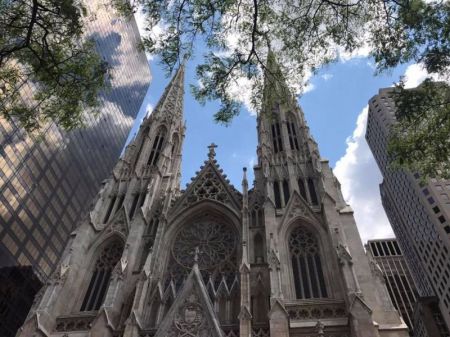Supreme Court blocks New York's COVID-19 restrictions on houses of worship

The Supreme Court ruled on Wednesday in favor of a Catholic diocese and an Orthodox Jewish group, temporarily blocking New York’s COVID-19 restrictions on houses of worship.
“Members of this Court are not public health experts, and we should respect the judgment of those with special expertise and responsibility in this area. But even in a pandemic, the Constitution cannot be put away and forgotten," the high court said in its 5-4 ruling. "The restrictions at issue here, by effectively barring many from attending religious services, strike at the very heart of the First Amendment’s guarantee of religious liberty.”
The court said that the Roman Catholic Diocese of Brooklyn and Agudath Israel of America are likely to succeed in their arguments that the restrictions violate the Free Exercise Clause of the First Amendment and that they would cause irreparable harm. The groups had sued Gov. Andrew Cuomo over his executive order limiting worship gatherings to 10 people for those in red zones and 25 for those in orange zones.
“… the regulations cannot be viewed as neutral because they single out houses of worship for especially harsh treatment,” the court said in its opinion. “They are far more restrictive than any COVID–related regulations that have previously come before the Court, much tighter than those adopted by many other jurisdictions hard-hit by the pandemic, and far more severe than has been shown to be required to prevent the spread of the virus at the applicants’ services.”
The court also noted that there has been no evidence of outbreaks of the coronavirus in the Catholic churches or Jewish synagogues — which have followed health guidelines — since they reopened.
In a concurring opinion, Justice Neil Gorsuch said Gov. Cuomo has allowed many businesses to remain open and that “the only explanation for treating religious places differently seems to be a judgment that what happens there just isn’t as ‘essential’ as what happens in secular spaces.”
“Indeed, the Governor is remarkably frank about this: In his judgment laundry and liquor, travel and tools, are all 'essential' while traditional religious exercises are not. That is exactly the kind of discrimination the First Amendment forbids,” Gorsuch added.
Last month, Cuomo had announced the creation of a “new cluster action initiative” aimed at areas of New York that were considered “hot spots” for infection. Areas were divided into red, orange and yellow zones depending on the number of positive COVID-19 cases.
Cuomo also threatened to close down synagogues and churches that did not comply with his executive orders on social distancing.
Chief Justice John Roberts joined the court’s three liberal justices in dissenting, noting that there was no need to grant injunctive relief given that the areas where the plaintiffs are located are no longer red or orange zones (they are now yellow zones where people can gather in houses of worship at 50% capacity).
In her dissent, Justice Sonia Sotomayor called free religious exercise “one of our most treasured and jealously guarded constitutional rights” and that “states may not discriminate against religious institutions, even when faced with a crisis as deadly as this one.”
“But those principles are not at stake today,” she wrote. “The Constitution does not forbid States from responding to public health crises through regulations that treat religious institutions equally or more favorably than comparable secular institutions, particularly when those regulations save lives. Because New York’s COVID– 19 restrictions do just that, I respectfully dissent.”





















